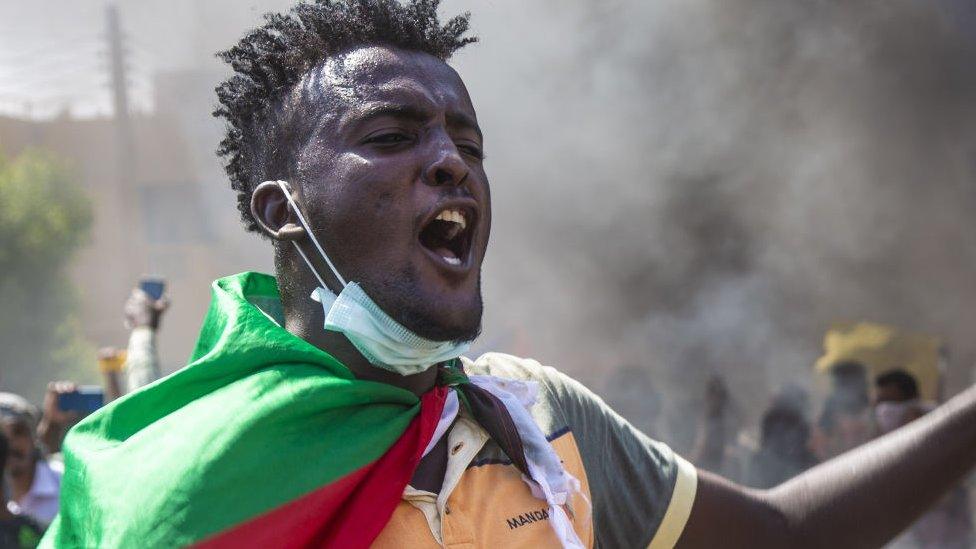Sudan protests: Tens of thousands march against military
- Published

Protesters backing the civilian government came out in the capital on Thursday
Tens of thousands of supporters of Sudan's transitional government marched around the country as rival protesters continue to demand military rule.
Deep divisions between military and civilian leaders are threatening to derail the transition to democracy.
They agreed to share power in the aftermath of the 2019 overthrow of long-serving President Omar al-Bashir.
Tensions have grown since a coup attempt attributed to followers of Bashir was foiled in September.
The divisions have caused a split in the Forces for Freedom and Change, a coalition of civilian groups that helped get rid of the former president.
On Thursday, security forces fired tear gas as activists backing the civilian transition burned tires and waved Sudanese flags.
Pro-military protesters want the civilian government dissolved. They accuse it of failing to revive the economy as bread shortages increase.
A blockade at Port Sudan, in the east, by yet another group, has only exacerbated the situation.
On Saturday, pro-military demonstrators chanted "down with the hunger government" and called for General Abdel Fattah al-Burhan, head of the armed forces and Sudan's joint military-civilian Sovereign Council, to instigate a coup and seize control of the country.
Some of them have remained outside the presidential palace in the capital, Khartoum.
But marching on Thursday in the city, protesters could be seen with banners proclaiming "civilian is the people's choice", the AFP news agency says.
It adds that they chanted: "Give up power, al-Burhan."
Control of the Sovereign Council is due to transfer to the civilians in the coming months as part of the transition to democracy.
Western nations have expressed their support for the civilian government. US Secretary of State, Anthony Blinken, urged all sides to follow the agreed transition to democratic rule.
Last week, Sudan's civilian Prime Minister Abdallah Hamdok unveiled a plan to tackle what he called the country's "worst and most dangerous" political crisis in its two-year transition.
"I am not neutral or a mediator in this conflict. My clear and firm position is complete alignment to the civilian democratic transition," he said.
Mr Hamdok was sworn in as prime minister in August 2019 after mass protests saw the military step in and end Bashir's 30-year-rule in April of that year.
But support for the transitional government has slumped in recent months as economic reforms spearheaded by Mr Hamdok have seen fuel subsidies slashed and inflation soar.
EXPLAINER: Sounding the alarm for Sudan鈥檚 democracy
AFRICA LIVE: Updates on this and other stories from the continent